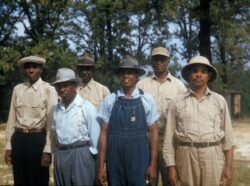This history of medicine and health care in the United States is rooted in racism and marked by the mistreatment of Black Americans. These historical structures are woven into modern medicine and their impacts are still felt today. Addressing racism, discrimination, and other systemic barriers within the health care system must happen to effectively promote health equity.
Remembering Anarcha, Lucy, and Betsey

Anarcha, Lucy, and Betsey were enslaved women from Alabama who changed the history of gynecology. In the 1840s, Dr. J. Marion Sims developed medical tools and surgical techniques related to women’s reproductive health. With neither consent nor anesthesia, Dr. Sims experimented on these women and later became credited as the “father of modern gynecology,” while Anarcha, Lucy, and Betsey were left out of the history books. Today we honor these women and the unnamed women who became the mothers of modern gynecology. Learn more in this NPR story.

